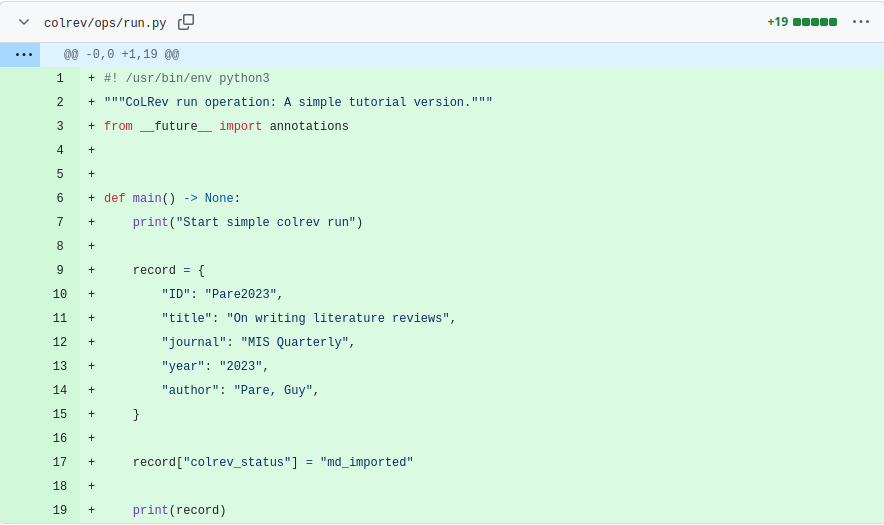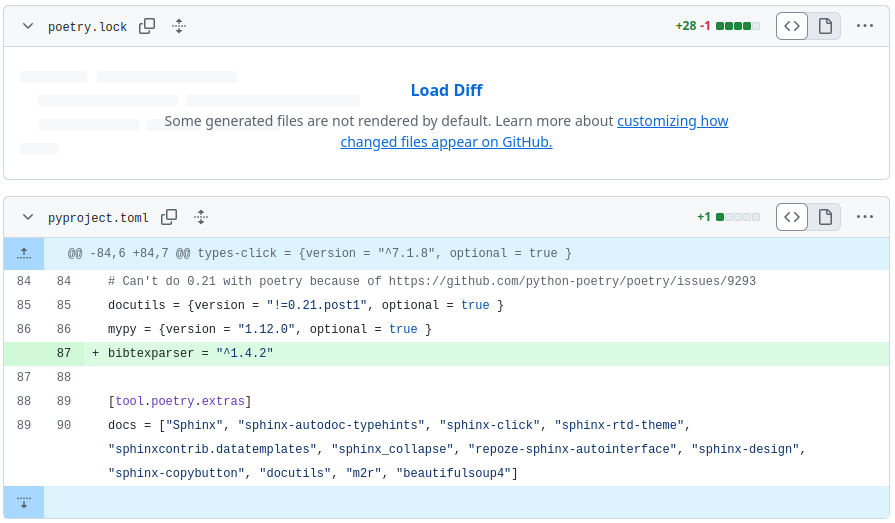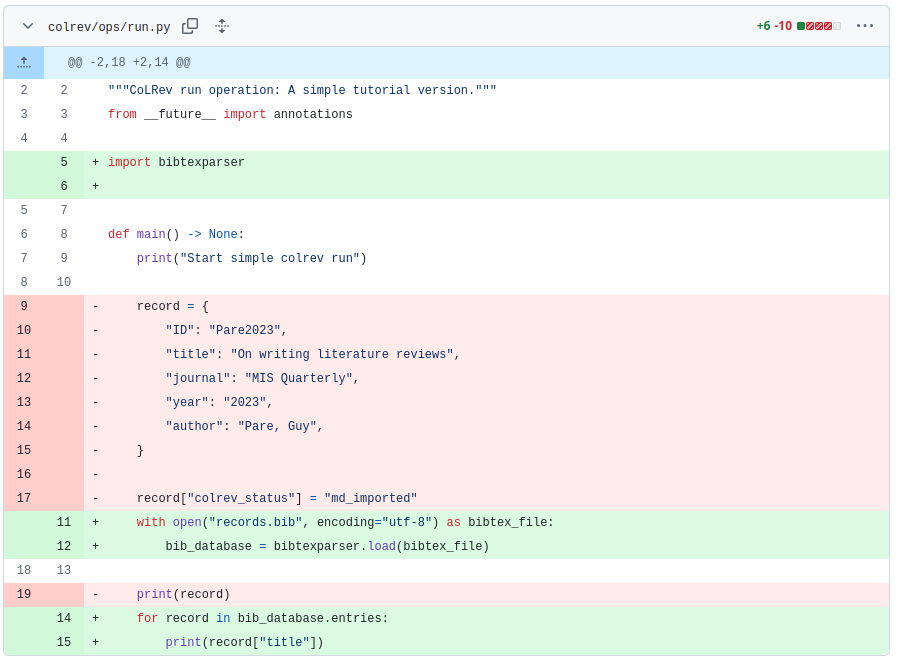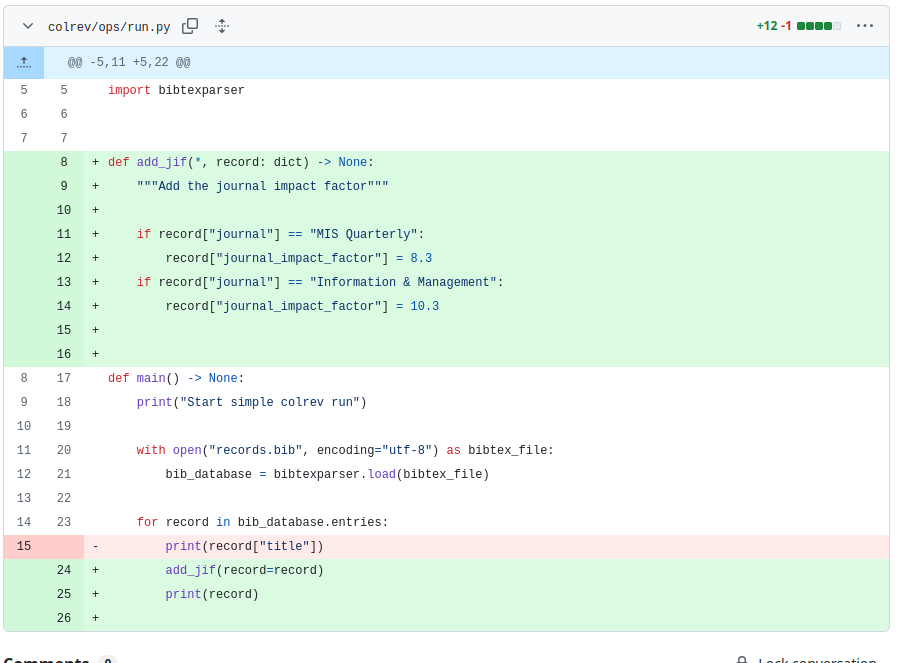Week 3: Python 1 (Teaching notes)
| Time (start) | Duration | Topic | Additional materials |
|---|---|---|---|
| 00:00 | 5 min | Group formation | |
| 00:05 | 30 min | Basic concepts | |
| 00:35 | 25 min | Part 1: Setup | notebook 1 |
| 01:00 | 30 min | Part 2: Data items | |
| 01:30 | 15 min | Break | |
| 01:45 | 30 min | Part 3: External libraries | |
| 02:15 | 70 min | Part 4: Functions | |
| 03:25 | 10 min | Wrap-up | |
| 03:35 | 205 min | Overall |
- Familiarize with Python syntax (assuming you have taken programming courses before)
- Learn good debugging and development practices
- Understand how to extend a Python package (CoLRev)
- Have students start the codespaces on Github from colrev/tutorial branch (see notebook)
- It is important that students work on Codespaces (not their own machines) to avoid technical setup issues
- Students can ignore the warning displayed when committing (cannot push due to a lack of permissions)
- It can be helpful to make mistakes on purpose (e.g., indentation, etc.) to read and interpret the error messages with students.
Group formation
- Who forked/leads
- Facilitate group formation, highlight cases where groups are overbooked (ask students to switch)
Before switching to tutorial/after the tutorial: run
pip3 install -e .
to take code from the right repository.
Python
- Object-oriented
- Procedural
- Functional
Interpreted language: unlike Java which requires us to compile the jar file
- Strongly typed: Explicit conversion required
- Python fails at runtime when asked to multiply/divide strings and strings. If you need the numbers stored inside a string variable, you need to cast it explicitly (
int_var = int("99")). - Dynamically typed: typing information is only evaluated when running code (e.g., string * string in if-statement that is not evaluated does not fail)
Example:
Java:
int count = 2;
Python:
count = 2
# type(count) = class:int (everything is an object)
word = "test"
count*word = "testtest"
word+count # raises TypeError (searches for addition-operation for two strings and fails)
word+str(count) + "test2"
# think: count = "2"
if False:
cound+word # not error - never executed (dynamically typed/only evaluated at runtime)
if True:
cound+word # error
Highlight:
- Our focus: using the programming language to build things (not to understand the programming language)
- Use google/Stackoverflow on any error/challenge that comes up!
- Using Code quality checkers and tests
Note: we work in a single directory. In session 2, we will distinguish the code and data directories.
Setup
-
Explain
__main__ - commit: pre-commit hooks!
- explain later (they do some formatting and warn us if there are code quality issues)
Goal: orientation/read code, try to figure out things
Data items
Optional additional challenge: use the constants as keys (package development docs)

External libraries
After 2-3 minutes: write BibtexParser on the blackboard
Important: bibtexparser version has changed
Students need to use the old entrypoint (available in the docs menu “Migrating: v1 -> v2”).
# v1
import bibtexparser
with open('bibtex.bib') as bibtex_file:
bib_database = bibtexparser.load(bibtex_file)


Functions
- Students can check whether the key (
journal) is in the record and whether it matches any of the entries with a journal impact factor.
Explain difference between call-by-value and call-by-reference
- Call-by-value: for “simple data types” (str, int, float)
- Call-by-reference: for mutable objects (list, dict, object)
# call-by-value
def change_journal(journal: str) -> None:
journal = "Nature"
journal = "MIS Quarterly"
change_journal(journal)
print(journal)
# prints MIS Quarterly (not Nature)
# due to call-by-value for simple/immutable data types in Python
# call-by-reference
def change_journal(record: dict) -> None:
record['journal'] = "Nature"
record = {
"ID": "Smith1990",
"jornal": "MIS Quarterly"
}
change_journal(record)
print(record)
# prints Nature because record is passed as an object reference
# (mutable type in Python) and modified in the function
Show input() when iterating over the results
Explain difference between positional and keyword arguments
- “mypy no-untyped-def”
- “mypy no-untyped-def”
- “pylint missing-function-docstring”
Pylint example.
example:
************* Module colrev.ops.built_in.search_sources.aisel
colrev/ops/built_in/search_sources/aisel.py:225:19: W3101: Missing timeout argument ...

Wrap-up
- Small examples: clarify the “big goal” and start with small steps
- Linters: already installed
- Code highlighting (visual studio): functions yellow, variables light blue, instances blue, classes green, strings orange
- Python debuggers/plugins (for regular Python programming / special cases like memory usage or distributed systems)
Resources
- Python programming for data science with Python basics (and unit tests)
- Welcome to Python Packages